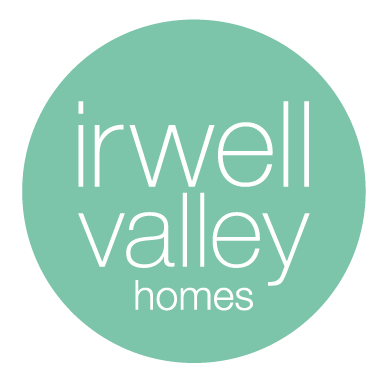Buying a lease buys you the right to live in your home for a fixed number of years. Your lease will state how long this is. As leaseholder, you have sole use and responsibility for the home.
If you live in an apartment, Irwell Valley Homes will usually own the building and any shared areas, such as the corridors, stairwells, and lift. The lease states that we are responsible for repairing the building, maintaining internal shared areas and the upkeep of any communal grounds/gardens.
And as a leaseholder, you are responsible for contributing towards the cost of these services in communal areas, for example cleaning shared corridors or repairing a lift. You pay for this through service charges – for more information about this click here.
To read our Leasehold Management policy click here.
Your lease is a detailed document containing various conditions and outlining the different rights and responsibilities of leaseholder and freeholder.
If you need any help understanding any of the terms of the lease, please get in touch - we’re here to help. Email leaseholders@irwellvalley.co.uk or call us on 0300 561 1111.
As an overview, your lease will contain:
- The parties to the lease – Irwell Valley Housing Association (The Landlord) and the original leaseholder.
- Payment of any ground rent (if applicable).
- The date of the lease.
- The term (length) of the lease.
- The conditions of the lease.
- Covenants – these are the duties for both the leaseholder and the landlord.
- How and when you should pay your rent and service charges.
- What will happen if you don’t pay your ground rent/service charge.
- The services that should be provided.
- Calculation of the service charge.
- How Surpluses (where actual costs are less than anticipated) and Deficits (where leaseholders have paid less than the actual cost) are managed.
- Service charges and how they are reviewed.
- Conditions regarding the re-sale of your home.
Your lease is a legal contract that can only be altered with your agreement (as the leaseholder) and our agreement (as the freeholder). It can be changed by a ‘Deed of Variation’ which may be approved by a court or a Leasehold Valuation Tribunal. There is an application fee of £205 for a Deed of Variation.
Most leaseholders have the right to buy an extension to the term of their lease. The usual extension term is 90 years for an apartment and 50 years for a house. Any extension bought is added to the term already remaining on the lease.
The cost of extending a lease depends on several factors. These include the term left on the lease, a current valuation from a Chartered Surveyor, and any rent that may be due.
A Chartered Surveyor will calculate the cost and an administration fee will be charged.
You are responsible for any repairs and maintenance work required in your home. You can find details of these in your lease. If your property was developed from 2021 onwards, we may be able to make a contribution towards some of your repairs if you are a shared owner. F for more information about this please contact the team: Email leaseholders@irwellvalley.co.uk or call us on 0300 561 1111.
Where another leaseholder has caused damage to your home - for example if a leak came from another leaseholder’s home – we will support you in asking the other leaseholder to arrange and cover the cost of the repair.
We are generally responsible for any repairs and maintenance to the structure of the building, the communal areas, and any equipment in these areas such as lift, door entry systems etc.
The cost for these repairs is usually recovered through the service charge. We will also look at which repairs can be claimed for through our insurance policy.
Report a repair to the structure of the building or communal areas here.
If there is damage to a shared area and we know who caused it, we will seek to recover the repair costs from them.
However, where we can’t identify who caused it, or the costs cannot be reclaimed, then the cost of the repair will be shared equally by all the leaseholders. This is detailed in the terms of the lease.
If any damage is caused to your home because of an accident in an adjoining property, (for example a fire), then you can claim on the property insurance that we arrange. Please contact the Sales and Leasehold Team if this happens. They will be able to guide you through the process. Please don’t start any repair work before the insurance company agree to pay for it, otherwise you may be liable for the full cost. There may be an excess payable on any claim made through our insurance company.
Please put your bins out for collection on the right day. If the council hasn’t removed the rubbish when they should, please contact them to arrange getting it collected.
We work with the council to provide an adequate number of bins. Please use the recycling bins correctly. If the wrong rubbish ends up in a recycling bin, the council may not collect it and the cost of clearing it may be passed on.
Large items, such as mattresses and fridges, might be collected by your local council. Please contact them to arrange collection. If we are asked to remove rubbish that is fly tipped in communal areas, we may pass on this cost too.
